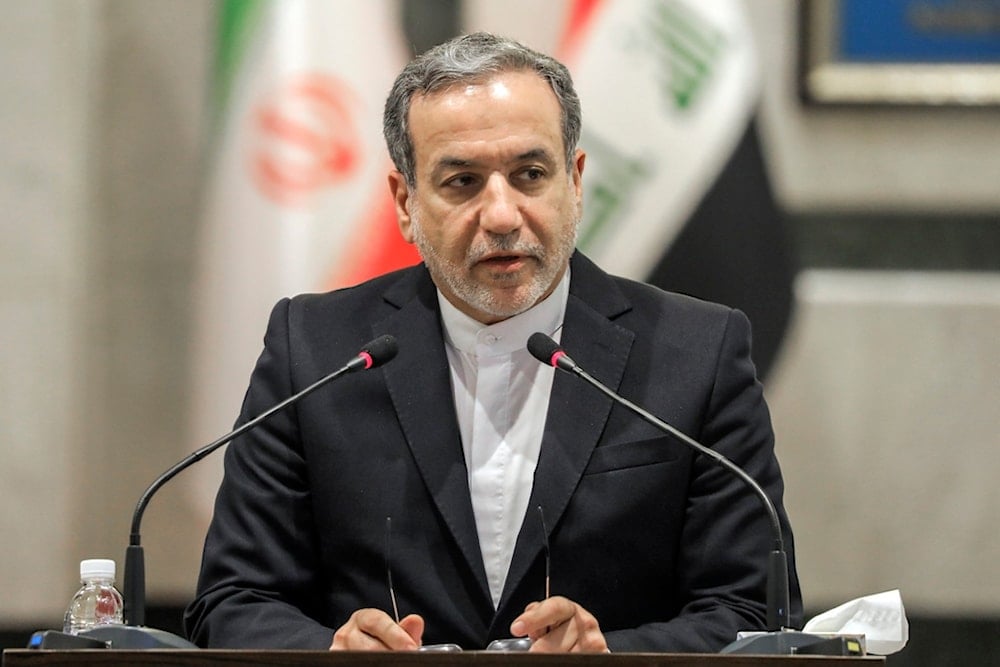Iran warns of countermeasures against potential IAEA board actions
When asked about Iran's stance toward the new US administration, Foreign Minister Araghchi stated that Tehran's policy would be guided by its national interests.
-

Iranian Foreign Minister Abbas Araghchi speaks during a joint press conference with his Iraqi counterpart Fouad Hussein during his visit to Baghdad, Iraq, on Sunday, October 13, 2024. (AP)
Iran issued a strong warning on Saturday, stating that any decision against it by the International Atomic Energy Agency's (IAEA) Board of Governors would be met with countermeasures, including further steps in its nuclear program.
Iranian Foreign Minister Abbas Araghchi, speaking in an interview with state television, affirmed Tehran's readiness for negotiations, asserting that "the windows of diplomacy remain open."
However, he also highlighted the changing nature of the 2015 nuclear deal, which was abandoned by former US President Donald Trump.
"The nuclear agreement no longer carries the same characteristics it once had," Araghchi remarked.
When asked about Iran's stance toward the new US administration, Araghchi stated that Tehran's policy would be guided by its national interests.
"Our position on the new US government will depend on its policies, the goals it announces, and the individuals it appoints," he explained.
Read more: Iran's cooperation tied to others' commitments, FM tells IAEA
Araghchi also addressed recent media reports alleging a meeting between Elon Musk and Iran's ambassador to the United Nations, dismissing and calling them "fabrications by American media."
Iran's foreign ministry reiterated this stance, categorically denying that its UN envoy had met with Musk in New York, calling the reports baseless.
No evidence of secret Iranian nuclear weapons development: IAEA chief
In an interview with the Swiss newspaper Neue Zurcher Zeitung on Thursday, International Atomic Energy Agency (IAEA) Director General Rafael Grossi said that there is no evidence that Iran is secretly developing nuclear weapons.
When asked about the possibility of Iran creating a nuclear bomb, Grossi said, "We have no information that the Iranians are pursuing a secret, parallel nuclear program."
Such a program has however existed in the past, as per IAEA data, he claimed.
At the same time, certain aspects of Tehran's nuclear activities, such as stocks of highly enriched uranium and the capability to manufacture advanced uranium centrifuges, raise concerns about potential links to a nuclear weapons program, according to Grossi.
"That's why we need clarity before there is a complete collapse of the surveillance system," the IAEA chief said.
Iran’s Stance on Retaliation
On Friday, Mohammad Eslami, the head of the Atomic Energy Organization of Iran (AEOI), cautioned that any anti-Iran resolution from the IAEA would trigger an "immediate response."
Speaking at a joint press conference in Tehran with Grossi, Eslami stated, "Any resolution against Iran's nuclear program will be met with Iran's immediate response."
He reiterated that Iran remains committed to its nuclear activities in line with national interests and will take reciprocal measures if faced with confrontational actions.
"If the opposite side takes the path of confrontation, resolution, and disruption against Iran, it will receive a reciprocal response," Eslami warned.
However, he also signaled Iran’s willingness to engage constructively, noting, "If they take the path of interaction, Iran is willing to interact, but if they choose another path, Iran will take necessary decisions."

 3 Min Read
3 Min Read








